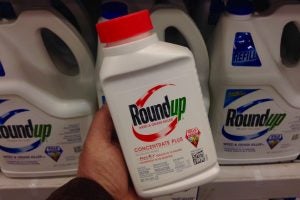For the third time in about two weeks, a jury delivered a major verdict against the makers of Roundup. Plaintiff Mike Dennis, who claimed he developed a form of non-Hodgkin lymphoma at the age of 51 due to exposure to the popular herbicide, was awarded a $332 million verdict in San Diego Superior County Court on Tuesday — the decision split between $ 7 million in compensatory damages and $325 million in punitive damages.
This latest verdict against Monsanto comes just a few days after another man was awarded $175 million from the Philadelphia Common Pleas Court by a jury that decided that glyphosate, the active ingredient in Roundup, is carcinogenic when in the presence of other compounds. Not long before that case, a Missouri jury awarded $1.25 million to a plaintiff in a similar proceeding.
Monsanto was acquired by Bayer in 2018.
According to a report from Law.com about Tuesday’s ruling, while jurors found that Monsanto failed to warn about the health risks of Roundup, they did not find that the agricultural seeds and crop protection manufacturer was negligent in designing the product.
Glyphosate, which has been around since the 1970s, is the active ingredient in Roundup and other products, such as Ranger Pro, and it is often targeted by activists speaking out against modern agricultural practices. Bayer’s lawyers have long argued that numerous studies have shown Roundup is safe, and the U.S. Environmental Protection Agency has concluded that glyphosate is not a carcinogen.
Independently, nearly all scientific bodies and associated research have affirmed the safety of glyphosate.
There are, however, more than 30,000 outstanding glyphosate-related claims, and Bayer has allocated about $16 billion for their settlements.

Roundup is the most common weedkiller in the U.S. and often hailed as one of the safest herbicides available. Most of the litigation against Monsanto and Bayer in recent years have relied largely on emotional testimony rather than scientific findings, much to the frustration of many in the agricultural sector. (This type of litigation is civil, not criminal, so there is significantly lower standards of legal liability.)
Lawsuits over glyphosate and human health are usually rooted in the International Agency for Research on Cancer’s 2015 classification of glyphosate as a “probable” carcinogen. When IARC first made the decision, it was immediately controversial, and that controversy has been growing in the years since, not the least of which related to questionable editing of draft versions of the original report before they were made public.


